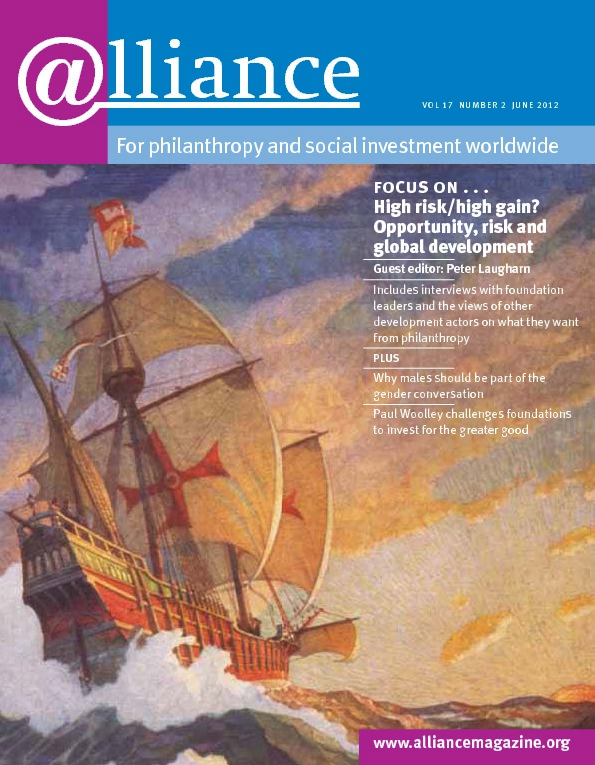Pears Foundation is a family foundation rooted in Jewish values. A number of areas in which we work require us to take risks. Our aim of promoting positive identity and citizenship, and building respect between people of different backgrounds and faiths, can lead us into thorny territory. One example is our work to improve understanding between Britain’s Jewish and Muslim minorities, on whom the Israeli-Palestinian conflict has had a polarizing effect, especially on university campuses.
Campuses had become battlegrounds for rival campaigners, which generated hostility and tension among students. To counter this, we introduced several initiatives: first, we established new posts in Israel and Middle East Studies at a number of UK universities. These have provided students with access to rigorous and independent academic scholarship relating to different aspects of Israel, while a new European Association of Israel Studies is facilitating cooperation among academics, and in turn high-quality research and teaching. The initiative has also been a stimulus to the resurgence of the complementary field of Palestine Studies. Second, we have supported the Olive Tree Initiative, a programme set up at the University of California to provide experiential education on the Israeli-Palestinian conflict. It offers students an opportunity to learn about the conflict through exposure to the realities on the ground as well as systematic pre-trip preparation and post-trip reflection.
Our hope in supporting these programmes is that students will develop a more nuanced understanding of the complexities of the Israeli state and society, and the causes and consequences of the Israeli-Palestinian conflict. In addition, we hope students will be provided with a safe space to express their views, have them questioned, and in turn question those of others.
We also co-founded the UK Task Force on issues relating to Israel’s Arab citizens in 2009, another initiative filling an educational gap. Its objective is to inform British Jews, most of whom support Israel but are largely unaware of its 20 per cent Arab Palestinian minority. This year, the task force organized a trip for over 50 representatives of British Jewish communal organizations to visit the Bedouin population of the Negev, including villages that currently lack access to basic services.
One unusual aspect of our efforts is that we aim to promote educational links between British universities on the one hand and both Israeli and Palestinian universities on the other. Some others support one or other of these causes but we are virtually alone in supporting both.
All these programmes involve risk and a willingness to be different. Inevitably there has been some resistance from vested interests intent on propping up the status quo. We have also faced criticism for working on both sides of the Jewish/Muslim and Israeli/Palestinian divide. For example, an editorial in one Jewish newspaper criticized our refusal to distance ourselves from an organization undertaking cutting-edge work with grassroots Muslim communities.
Our work on Israel Studies has also excited controversy, some claiming that our motivation is to promote Israel not Israel Studies or academic scholarship about Israel. Ironically we knew that by not being involved, we would have risked allowing precisely this scenario to develop. By taking action, and moving more quickly than others less committed to academic independence, we were able to help to prevent the field of Israel Studies being taken over by agenda-driven protagonists.
None of these challenges has prevented us from standing our ground. In fact, we have redoubled our efforts in these areas. In so doing we have received support, encouragement and admiration from members of the philanthropic community, some of our co-religionists and the academic institutions with whom we have nurtured close relationships.
There are several important lessons here: to appreciate the advantages of philanthropy’s independence; to be clear about objectives and strategy; to ensure that interventions are based on rigorous research and evidence, as well as a good assessment of the various courses of action. Most crucially, our experiences reveal the importance of taking risks and seeking to carve out space that others have either overlooked or sought to prevent from emerging.

Philanthropy can, and ideally should, be a tugboat pulling people and organizations off the rocks and charting new courses. The biggest risk philanthropists and philanthropy professionals face is squandering their intellectual and financial assets by not daring to be different.
Charles Keidan is director of Pears Foundation. Email ckeidan@pearsfoundation.org.uk
He is convening a session on 6 June 2012 at the EFC conference in Belfast on philanthropic investment in education on the Israeli-Palestinian conflict.





Comments (0)